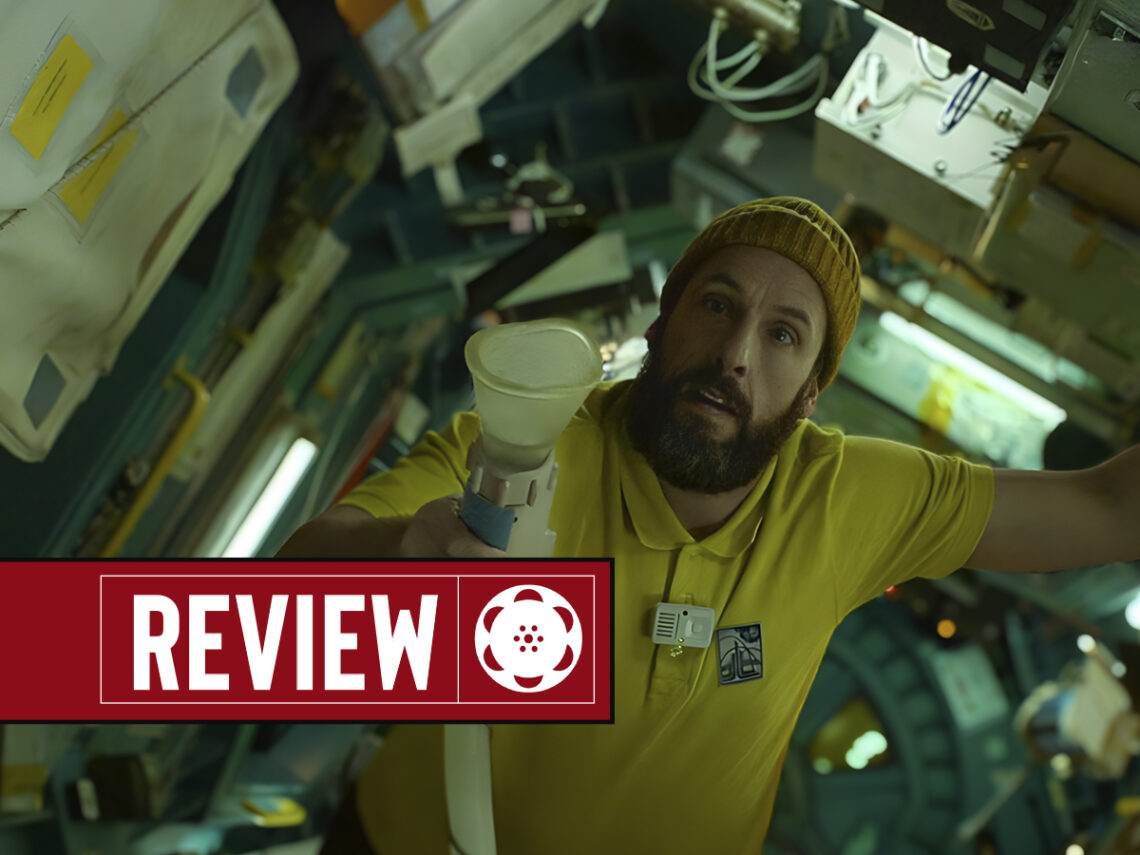Put Adam Sandler, a giant talking spider, and deep space together, and you might think you are in for a cosmic comedy. Instead, Johan Renck serves up a 148-minute-long meditation on loneliness in Spaceman, a film that would fit right in Charlie Brooker’s Black Mirror. In fact, Spaceman feels like an extension of the season six episode of the dystopian series, ‘Beyond the Sea’ with its retrofuturistic motifs and themes of isolation and familial disharmony resonant in the adaptation of the 2017 novel Spaceman of Bohemia by Jaroslav Kalfař.
Sandler, after Uncut Gems, is once again brilliant in his refined restraint. Renck didn’t want Sandler to sound like himself, and he doesn’t. Carey Mulligan infuses a lot of complexity in a comparatively smaller role. But for all its brightly lit corners, Spaceman is bleak to its core. After all, Renck’s directorial debut, Downloading Nancy, has proven that the filmmaker enjoys exploring melancholia of the pathological kind in his stories.
At slightly less than two hours runtime, Spaceman has a lot to say but ultimately ends up being a story of a marriage falling apart. It touches upon themes of self-destruction in pursuit of a higher calling, a theme Damien Chazelle has made his own with films like Whiplash and La La Land.
Renck’s Spaceman revolves around Sandler’s Jakub Procházka, a Czech astronaut dispatched to the outer reaches of our solar system to investigate and collect particles from the mysterious purple cloud that has appeared in the sky. In his bid to become an international space hero, Jakub leaves his pregnant wife, Lenka (Mulligan), and his crumbling marriage behind. Roughly six months into his journey to the limitless oblivion of space, abandoned by Lenka and amid many glitches that abound the spaceship, Jakub finally begins to fall apart. That is until a giant spider with the soothing ASMR voice of Paul Dano shows up to help him navigate much of his self-inflicted misery.
Jakub names this alien arachnid Hanuš. The hairy giant has the biggest puppy dog eyes (all six of them) that can turn menacing at once. Hanuš is quite likely a nervous manifestation of Jakub’s deepest, darkest thoughts. He has been living with many voices in his head—Lenka, his liaison on the ground, Kunal Nayyar’s Peter, and his commanding officer, Commissioner Tuma (played by Isabella Rossellini). So what is one more?
As Hanuš helps him navigate his emotional inadequacy like an eight-legged therapist, Jakub finally realises that Lenka is not his Manic Pixie Dream Girl, nor does she exist just to be his safe haven. Of course, like most emotionally stunted men, Jakub needed to hurl himself into deep space and have Lenka finally leave him to understand her value. As funny as that may sound, Spaceman is deeply unfunny—even in the scenes where Jakub has to drone out ad slogans at odd intervals to appease the capitalist overlords sponsoring the independent space mission.
This is a film that drips with sadness. The images on the screen come alive with verdant blues, yellows, and reds, but in the end, this Adam Sandler vehicle is tedious to get through. Beautiful but tedious. Jakob Ihre captures Sandler in the most claustrophobic spaces as he tries to understand why we yearn for things only when they’re gone.
Much of the political context of Kalfař’s novel is left behind in Colby Day’s adapted screenplay. But we are given glimpses of Jakub’s past. His father was marked a traitor for spying on behalf of the Communist Party before their fall. He was burnt to death, an event that scars a young Jakub but also propels his ambition to become a national hero; all so that he could “atone for his father’s sins.” And that is how Spaceman gets to become a haunting indictment of patriarchy and its first victims: men.
In most corners of the world, men are still taught to take refuge in violence, cower in their desolatory solitude, and encouraged to commit emotional self-mutilation from the moment they have consciousness. They are not taught to see women as anything more than human incubators or rehabilitation centres for their battered selves. Spaceman merely uses its sci-fi elements as a crutch to excavate the epidemic of male loneliness.
Human beings have always tried to make sense of the mundane through fantastical stories—whether they are full of glittery stardust, philosophical arachnids, or mythical water nymphs. Through Jakub’s schizophrenic hallucinations, Spaceman tries to make sense of existentialism. However, as a space exploration sci-fi vehicle, it struggles to offer anything extraordinary.
